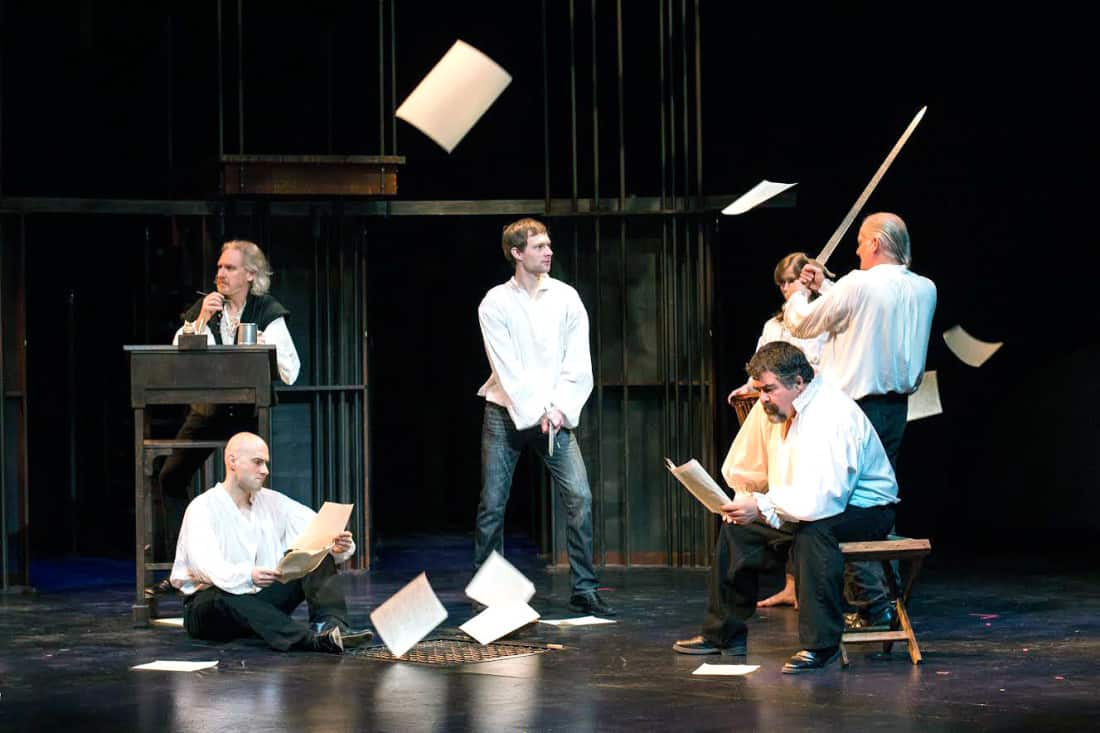
Equivocation presents a cast of six actors, some of whom switch between various roles multiple times.
Currently on the Persephone main stage in Saskatoon, Equivocation is a gripping play that explores history, politics, morality and the meaning of truth.
Referred to as Shagspeare or Shag, the story revolves around William Shakespeare as he is tasked with writing a play about the recent treasonous Gunpowder Plot — an attempt to blow up both Parliament and King James I of England.
In the play King James I himself wrote the story of the Gunpowder Plot for Shakespeare to work with, the only request being that he add in flattery and witches. With some hesitation Shakespeare agrees to accept the commission due to a large sum of money involved.
This task is a difficult one for the hero to complete, as he does not write on current events. As Shakespeare discovers the hidden truth of the Gunpowder Plot and grapples with hard decisions, his actions involve the unfolding of political motives and learning how to tell the truth in difficult times.
The title for the play is fitting in that equivocation means to use ambigous language to conceal the truth or to avoid committing oneself. This is entirely applicible to the storyline, as the original version of the Gunpowder Plot play turns out to be based upon lies.
The story is told through Shakespeare’s interactions with other characters such as his acting company, which initially disagrees with what he has written. As Shakespeare struggles to write the play, he cleverly yanks Macbeth from a discard pile of his work just in time to present something pleasing to the king.
The set for Equivocation is simple and effective, taking place in various locales around London, England in 1606. Set transitions were practical and done by the actors themselves. The general set was fairly transparent and aided in functioning as various locations — from the theatre company’s practice room to a London court room.
To swtich scenes or show the passage of time, very interesting techniques were used. At one point when Shakespeare is working on the play, pieces of paper fall from the roof in a random fashion to show the progression of his work.
The cast is made up of a total of six actors: five men and one woman. Shakespeare and his daughter Judith remain the same actors throughout the story while the other four switch between various roles — sometimes with very little costume notice or change.
The character transitions were very clear to the audience — distinct, smooth and at times humorous. One memorable moment has a member of Shakespeare’s acting troupe trading roles to become another character, Cecil Rhodes, without the audience’s notice. The switch livens up the scene entirely as the remaining characters respond to the change.
The changing roles were definitely an asset to the play, as they allowed for various perspectives to be brought in. As Shakespeare’s actors begin to work on the play that he is writing, the audience also gets to experience a ‘play within a play’ effect both amusing and powerful.
The interactions between the protagonist and the other characters reveal much about Shakespeare’s character, including surprising elements like a shallow relationship with his daughter after losing his only son — a twist with strong feminist undertones. Knowing additional outside information about Shakespeare and his life is beneficial to the viewer, but not necessary.
Written by Bill Cain, the current run of Equivocation is the Canadian premiere. Cain is the founder of the Boston Shakespeare Company and has been awarded for his work on various occasions.
The casting for this rendition of Equivocation was extremely suitable and accurate. The actors chosen for the numerous characters were able to fit their multiple roles effortlessly, including convincing accents and appearances that were similar to how an audience would imagine the various historical characters to look.
Costuming was modest, often dressing the four changing actors in t-shirts and jeans with accessories to denote character switches. Shakespeare and his daughter Judith wore more traditional attire, fitting with the time period.
The simplicity of the costumes allowed for such fluidity between characters and also let the audience pay closer attention to the acting and the story’s message rather than elaborate embellishments.
Running at about two hours and 20 minutes in length, Equivocation captured and held the audience’s attention. Thrilling scenes such as public hangings and heated arguments kept the plot moving forward, adding tension and complexity between characters.
Equivocation has elements of comedy and tragedy combined, drawing certain aspects of theatre from some of Shakespeare’s plays and using the audience’s knowledge of those to the story’s advantage. Sly, almost snarky remarks were made toward Shakespeare himself — including a joke about how people would debate his existence in the future.
The plot presents a more serious tone through the treasonous conspiracy, at times akin to a dark thriller. Going beyond chronicling history’s most famous playwright at work, Equivocation also reveals themes of a conflict many artists experience: appeasing others or moral obligation.
On the main stage at Persephone Theatre until March 30, ticket information and show times for Equivocation can be found at persephonetheatre.org.
—
Naomi Zurevinski / Culture Editor
Photo: Stephen Rutherford
Leave a Reply